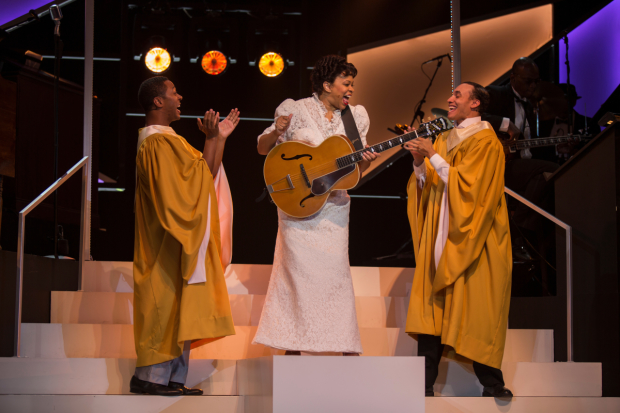Shout Sister Shout!

(© Jim Cox Photography)
Rosetta Tharpe was a pioneer rock artist who inspired many individuals and the future of rock and roll itself, but Randy Johnson and Cheryl L. West, the creators of Shout Sister Shout!, do not seem to trust the power of Tharpe's story on its own merits. Instead, they structure a convoluted fantasy around this life story that feels as if it was directly cribbed from Frank Capra's It's a Wonderful Life.
In heaven, Rosetta (Tracy Nicole Chapman) has been commanded to perform one final good dead before she can enter the pearly gates: She must discourage a young, suicidal musician, Isaiah (Logan Charles), from ending his life. Rosetta shares her life story with the boy in hopes that it will reaffirm his desire to live. Her rags-to-riches story begins as the put-upon wife of a philandering minister (Michael A. Shepperd), who is discovered by an agent in her small southern town, only to become a gospel-rock star during the mid-century. Rosetta falls in love with a female piano player (Angela Teek Hitchman), but when tragedy strikes, their relationship falters. Rosetta's talent, gumption, and the support of her mother (Yvette Cason) keep her head above water.
West's book feels like a first-draft outline rather than a fully fleshed-out story. Events occur so fast, and with so little context, that the audience gets whiplash. Rosetta marries someone she never met; now she's in an abusive marriage; now she's performing at the famous Cotton Club; now she's at Carnegie Hall. It's all shorthand writing that never gives Rosetta's story a chance to sit long enough for the character, let alone the audience, to process what's happening next.
While the plot hinges on Rosetta motivating young Isaiah, it is unclear why she shows him clips of her life instead of reminding him of the good moments in his own. Isaiah is merely a cypher who is only around to make running commentary and eventually create a generic ballad.
Randy Johnson's direction is flavorless and awkwardly paced. The scenes move slowly with the characters not given much motivation for their behavior. Johnson does not seem to know what to do with the character of Isaiah, instead leaving him hovering in the background, which only highlights how much of a hole that character is in the book.
The musical numbers are the high points of the production. The evening includes gospel and rhythm & blues songs either connected to or written by Tharpe. The title song is a rousing gospel rock anthem. "Jericho", is a showstopper and "I'm Going to Live the Life I Sing About in My Song" gives both Cason and Hitchman a chance to show off their solid pipes. Two original songs written by Melissa Manchester, one that introduces Isaiah to the audience, and the song at the end that Isaiah writes after learning the value of cherishing life, are both lackluster when juxtaposed to Rosetta's original songs.
Chapman has a feisty attitude that brings oomph to Rosetta, but her guitar fingering is haphazard. Much is said about Rosetta being a foreparent of rock-and-roll posturing, but Chapman barely strums the guitar. Charles is adrift without a character to play, overacting often and punctuating his words with his hands. His voice does has a nice indie-rock quality to it that calls to mind the singer Adam Lambert, though. Cason, a belter with a voice to be reckoned with, is delightful as both Rosetta's no-nonsense mother and the legendary singer Mahalia Jackson. Thomas Hobson flawlessly impersonates Little Richard in a role one wishes were larger than a cameo.
Rahn Coleman and his band bring out the elation in the score. Steven C. Kemp's scenic design is simplistic but functional, with multiple prosceniums lit up to represent the various performance spaces. Jared A. Sayeg's lighting highlights with warm colors that give the set a dream-like quality. Dana Rebecca Woods's costumes appropriately transition Rosetta from her humble beginnings in Act 1 to her emergence as a sophisticated lady in Act 2.
After hearing the songs written and made popular by Rosetta Tharpe, it is clear there is the potential for a great musical. But Shout Sister Shout! does a disservice to her talent and hardships. Instead of forming a complex story from the pages of Tharpe's life ambitions and foibles, or even simply relying on her music in more of a jukebox musical form, the creators chose a path that sheds little light on this trailblazing artist. Tharpe is one sister who deserves more than just a shout.











